
Nris In UAE: Steps To Take While Returning Permanently To India
Question: I am returning to India for good before the end of this month as I am planning to take up employment with a Global Capability Centre. Will I have to convert my NRE account into a resident account? I also have a Non-Resident (Ordinary) Account. Will I be able to remit funds from my Indian bank account to finance my children's foreign education expenses?
ANSWER: According to the rules set out in the Reserve Bank of India's Master Direction, a non-resident who returns to India for the purpose of taking up employment or starting a business or vocation would need to inform his bank where he has a Non-Resident (External) Account and/or a Non-Resident (Ordinary) Account, so that these accounts would be designated by the bank as resident accounts. The interest on the Non-Resident (External) Account which you have earned up to the date of its conversion to a resident account would be exempt from tax if you have satisfied the conditions to be classified as resident but not ordinarily resident.
Recommended For YouYou will be eligible to avail of the benefit of the Liberalised Remittance Scheme, which is applicable to all resident Indians. You can remit funds every year from your resident account up to $250,000 for meeting the expenses of your children's overseas education, their maintenance as well as for any medical expenses which you or your family may have to incur in future. This benefit can be availed every year indefinitely.
Question: Will the GST reforms introduced this month give a boost to industrial growth and spur consumer confidence?
ANSWER: India's second generation GST reforms have been widely welcomed by captains of Indian industry. Several manufacturing sectors will benefit from the rationalisation of GST slabs. The automobile sector comprising passenger cars, two-wheelers and tractor manufacturing companies will be major beneficiaries as GST has been reduced from 28 per cent to 18 per cent for several products. Further, the reduction of GST from 28 per cent to 18 per cent will prove a boon for the cement industry as cement price will decrease by Rs.30 per bag. Chemical and fertilizer companies will gain substantially as GST on key raw materials has been reduced from 12 per cent to 5 per cent. Producers of white goods like television sets, air conditioners, dishwashers, etc. will see a boost in sales as a result of GST reduction from 28 per cent to 18 per cent. Clean energy sector will get substantial relief as the GST on solar cells has been brought down to 5 per cent from 12 per cent. Medium and small scale enterprises which are engaged in manufacture of textiles and footwear will reap substantial benefits with the reduction of GST from 12 per cent to 5 per cent.
Thus, India Inc will enjoy an increase in their earnings from the second half of this fiscal year on account of higher sales volumes and lower costs which will improve their margins, stimulate demand and ease inflation. Further, GST rationalisation will bring tangible relief to household budgets. The consumer goods industry is bullish as this reform will impact every stakeholder in the retail value chain, including farmers, micro enterprises, shop owners and end consumers. It is expected by economists that these reforms will have the potential to accelerate the economy even further and raise the growth rate closer to 9 per cent.
Question: While Sebi has prescribed insider trading regulations applicable to listed companies, it has been suspected that sensitive information is leaked out by bank officials who deal with the listed companies leading to stock scams. Can there be any safeguards in this respect?
ANSWER: The Chairman of the Securities & Exchange Board of India recently directed banks to place the highest priority on safeguarding unpublished price sensitive information (UPSI) which could pertain to the bank itself or listed companies that are customers of the bank. He urged banks to have a robust internal control framework that ensures accountability and a clear understanding among bank employees of their responsibilities based on written policies and codes of conduct. According to him, insider trading risks thrive when controls are weak and where processes are unclear, responsibilities are undefined, and oversight is inconsistent. Weak controls and processes were the prime reasons behind many stock market-related frauds.
The Sebi Chairman further highlighted the importance of the role of compliance officers of banks under its Prevention of Insider Trading Regulations. The board of directors of banks were directed to ensure that the compliance officers are fully empowered with effective authority and given the full mandate to independently enforce regulations of Sebi. According to him, compliance with regulations is not just a legal obligation but a moral responsibility.
The writer is a practicing lawyer, specialising in corporate and fiscal laws of India.

Legal Disclaimer:
MENAFN provides the
information “as is” without warranty of any kind. We do not accept
any responsibility or liability for the accuracy, content, images,
videos, licenses, completeness, legality, or reliability of the information
contained in this article. If you have any complaints or copyright
issues related to this article, kindly contact the provider above.


















Comments
No comment